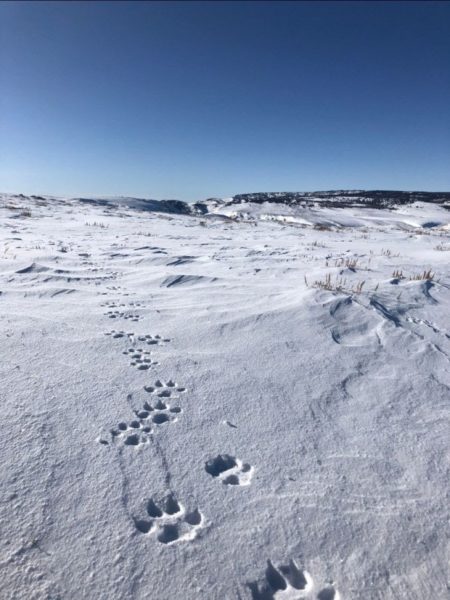
Colorado Parks and Wildlife unveiled the results of genetic tests Thursday that confirm the presence of wolves — three females and one male related to each other — in the northwestern part of the state.

State biologists received a notice confirming that four scat samples collected last month near a scavenged elk carcass in Moffat County came from wolves. CPW officials said the evidence suggests the wolves, the first group documented in Colorado since the 1940s, likely are siblings. DNA testing did not determine ages.
“We don’t know where or when they were born,” CPW’s species conservation program manager Eric Odell said in a statement Thursday morning. “But that there are closely related wolves is a pretty significant finding.”
State wildlife officers investigating a cow carcass found evidence of at least six wolves, following an earlier report by hunters of a group of wolves that agency biologists deemed credible.
And Gov. Jared Polis in January announced he was “honored to welcome our canine friends back to Colorado after their long absence.” Polis also said “it is important that people give them space.”
There may be more than four wolves, CPW officials said, and the agency is waiting to receive more DNA test results from scat samples collected in January.
Colorado voters this year will decide whether to require state wildlife officials to reintroduce gray wolves, an endangered species, by the end of 2023 on public land in western Colorado west of the Continental Divide. State wildlife officials also would be required to set up a fund to compensate livestock owners for any losses.
Lone wolves periodically have entered Colorado.
In the past, state wildlife officials investigated wolf reintroduction and decided against it. But Colorado residents pushed through the ballot initiative approved earlier this year. Wolves remain a federally protected endangered species, and killing a wolf can result in federal charges and the possibility of a $100,000 fine and a year in prison.
Leaders of a campaign against reintroducing wolves have rallied local government leaders in more than two dozen counties. Many rural residents are challenging reintroduction efforts driven by urban voters.
“Yeah, we have a confirmed wolf pack now,” Colorado Cattlemen’s Association vice president Terry Fankhauser said. “Wolves are going to migrate to Colorado. They’re already doing it. Why are we going to introduce wolves? What will that do to the wolf packs that are already here?”
Those in favor of reintroducing wolves on habitat in western Colorado contend wolves would help restore ecological balance by bringing a much-needed predator for out-of-kilter deer and elk herds. Wildlife advocates see Colorado as a missing link in efforts to connect wolf habitat from the Arctic to Mexico. And on Thursday they embraced the DNA results.
“This strengthens the argument for reintroduction because these animals are related and, if they do end up staying in Colorado, it doesn’t represent genetic diversity. We need to reintroduce wolves to help them build on the success of the wandering wolves who have come into the state on their own,” Rocky Mountain Wolf Action Fund president Rob Edward said.
“We don’t know if these wolves are still here. We don’t know if they come and go, because they’re right in the northwestern corner of the state. And reintroduction is the only way we’re going to have a management scheme that gives flexibility for any problems that arise.”
Currently, ranchers would have little recourse if wolves attack livestock and likely would not receive compensation for damage or losses, Edward said. A state-run wolf management program would ensure compensation and give guidelines for livestock owners, he said.
Fankhauser questioned whether CPW will be able to fund such a program.














